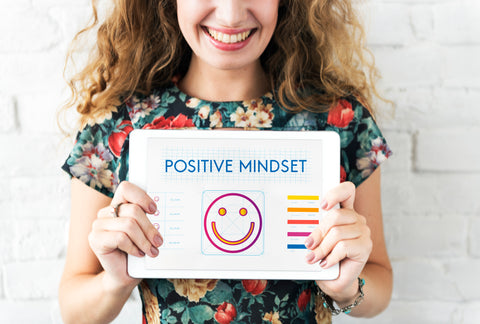Boost Your Emotional Intelligence with Effective Mood Tracking Techniques
In our fast-paced world, emotional intelligence has become a highly sought-after skill. It's the ability to recognize, understand, and manage our emotions, as well as the emotions of others. For many, this has proven to be the secret sauce to personal and professional success. But how can we develop and enhance our emotional intelligence? One surprisingly effective way is through mood tracking.
Mood tracking involves recording your emotions throughout the day, helping you develop a deeper understanding of your emotional patterns and triggers. In this blog post, we'll explore the benefits of mood tracking for managing stress and maintaining emotional balance. So, let's dive into the world of mood tracking for mental wellness.

The Science Behind Mood Tracking
Before we jump into the nitty-gritty of mood tracking, let's take a moment to explore the connection between emotions and mental wellness. Our emotions play a crucial role in our overall well-being. They can influence our decision-making, relationships, and even our physical health. In fact, research has shown that individuals with higher emotional intelligence are more likely to experience better mental health, improved job performance, and stronger interpersonal relationships.
Mood tracking can help us identify emotional patterns and triggers that might be affecting our mental wellness. By paying close attention to our emotions and recording them in a mood tracker, we can begin to recognize patterns and understand the factors that may be contributing to our emotional state. This awareness can lead to better decision-making, improved self-regulation, and increased emotional resilience.
Moreover, incorporating habit tracking into your mood-tracking routine can help you stay consistent with your emotional awareness efforts. Habit trackers are tools designed to help you keep track of your daily activities and monitor your progress toward achieving specific goals. By using a habit tracker to maintain your mood-tracking routine, you can stay accountable and make mood-tracking an integral part of your life.
Getting Started with Mood Tracking
Now that we understand the benefits of mood tracking, let's explore different methods to get started. There are various tools available to help you track your emotions, from traditional journaling to user-friendly apps. Here are some tips to get you started on your mood-tracking journey:
- Choose a method that works for you: There's no one-size-fits-all approach to mood tracking. Some people prefer pen and paper, while others might find digital tools more convenient. Experiment with different methods, such as a physical journal, a mobile app, or even a simple spreadsheet, to find the one that suits you best.
- Make it a part of your daily routine: Consistency is key when it comes to mood tracking. To get the most out of this practice, try to set aside a few minutes each day to record your emotions. This could be during your morning coffee, right before bed, or any time that works for you. The important thing is to create a habit and stick to it.
- Use a habit tracker for accountability: Integrating a habit tracker into your mood-tracking routine can help you stay consistent and motivated. Whether it's a dedicated habit-tracking app, a bullet journal, or a simple checklist, using a habit tracker can help you keep track of your progress and ensure that mood tracking becomes a regular part of your life.
Applying Mood Tracking Insights for Personal Growth
Once you've established a mood-tracking routine, you'll likely begin to notice patterns in your emotions. These insights can be incredibly valuable for personal growth and mental wellness.
Here are some tips for interpreting and applying the information you gather from your mood tracker:
- Identify patterns and triggers: As you review your mood-tracking data, you may begin to notice recurring patterns. Perhaps you feel more stressed on days when you have a looming deadline, or you might notice that a particular activity consistently lifts your spirits. Recognizing these patterns and triggers can help you make more informed decisions about how to manage your emotions and reduce stress in your life.
- Develop coping strategies: Once you've identified your emotional patterns and triggers, you can start developing coping strategies to manage stress and maintain emotional balance. For example, if you find that exercise helps improve your mood, make it a point to prioritize regular physical activity. Or, if you discover that certain situations consistently cause stress, brainstorm ways to minimize or avoid those situations whenever possible.
- Foster emotional resilience: By understanding your emotional patterns, you can work on building emotional resilience. Emotional resilience is the ability to adapt and recover from stressful situations or setbacks. It's a crucial skill for maintaining mental wellness in our ever-changing world. Some strategies for fostering emotional resilience include practicing mindfulness, seeking social support, and developing a growth mindset.
- Make self-improvement a priority: Mood tracking can be an excellent tool for personal growth. Use the insights gained from your mood tracker to set goals and make changes that will positively impact your emotional well-being. This might involve working on communication skills, improving time management, or simply dedicating more time to self-care. Remember, personal growth is a lifelong journey, and mood tracking can be a valuable guide along the way.
Mood tracking is a powerful tool for enhancing emotional intelligence and promoting mental wellness. By incorporating mood tracking into your daily routine, you can gain valuable insights into your emotional patterns and triggers, develop effective coping strategies, and foster emotional resilience. So why not give it a try? Start your mood-tracking journey today, and discover the benefits of improved emotional intelligence for your mental wellness and overall well-being.

















Share and get 15% off!
Simply share this product on one of the following social networks and you will unlock 15% off!